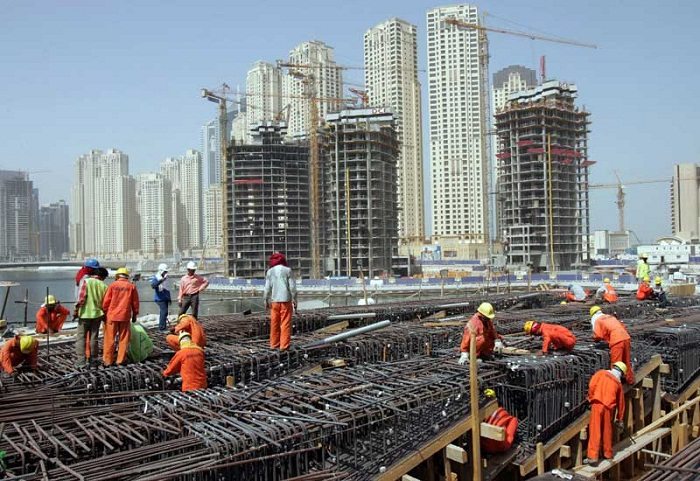In its 60 years as an independent country, Nigeria has grown in leaps and bounds in terms of infrastructural development. Some of the projects have become landmarks, many others are reference points in engineering and construction ingenuity. The great work of turning around the landscape of many parts of the country from nothing to something has been done by various companies. We present Nigeria’s top and ambitious construction companies.
1. JULIUS BERGER
Julius Berger Nigeria Plc is a leading Nigerian company offering holistic services covering the planning, design, engineering, construction, operation and maintenance of buildings, infrastructure and industry projects in Nigeria. Our history of success together with the shared values that define our culture and way of working gives our clients the confidence to trust us with even their most demanding projects. Operating sustainability, we adhere to the highest standards for quality and safety. To maintain excellence in construction, we stay at the forefront of the industry, continuously building on our robust experience and strong technical expertise through development and innovation for the creation of long-term value for our stakeholders.
2. SETRACO
Setraco was established in 1977 and started by constructing township and district roads in what was then Bendel State. Over the last thirty years the Company has rapidly grown to become one of the largest construction companies in Nigeria specialized in roads and bridges. With a presence today in around 20 states; Setraco has played a key role in developing Nigeria’s infrastructure as the Country strives towards becoming a developed nation.With projects executed successfully in over 20 states, and current presence in 15 states, Setraco has played a key role in developing Nigeria’s infrastructure.
3. REYNOLDS CONSTRUCTION COMPANY (RCC)
Reynolds Construction Company (Nigeria) Limited is a subsidiary of SBI International Holdings AG (SBI), whose headquarters is in Switzerland. SBI is a transnational construction and development group, with subsidiaries in several countries of the world.
The Group’s projects span the globe with concentration of activities in Africa, Central America and Europe. SBI’s first foray into Nigeria was in 1956 when it established a construction company called Nigersol Construction Company Limited together with some Nigerian investors. It operations covers: Road Construction, Water (irrigation, land preservation, drainage, flood control, borehole sinking, water supply and sewage disposal), Buildings as well as quarries and plants.
4. MONIER CONSTRUCTION COMPANY
Monier Construction Company (Nigeria) Limited. is a leading Civil Engineering and Construction Company in Nigeria with a solid reputation acquired over a period of five decades. We are a member of the Federation of building and Civil Engineering Contractors in Nigeria. MCC Is one of the early entrants in Nigeria’s construction industry having been present since 1955 and incorporated in 1957 as a Building and Civil Engineering Contractor with Head Office IN Port Harcourt, Rivers State. It parades state of the art equipment in Road Construction, Building and other key sectors of the Construction Industry. the Company, at the time of incorporation in 1957, was wholly owned German Company, but with the passage of time Nigeria investors acquired interests in MCC. Today, we can proudly state that MCC is truly Nigerian, owned by Nigerians and managed by Nigerians.
5. STILL EARTH CONSTRUCTION AND REALTY
Still Earth Construction and Realty is a premier general contractor highly regarded as one of the leading engineering & construction companies in Nigeria with a portfolio of completed projects and satisfied clients that are in both the public and private sectors.
With headquarters in Parkview, Ikoyi, Lagos, Still Earth is committed to developing the country’s infrastructural base by responsibly executing every project it is entrusted with, while creating real benefit for communities it serves by adopting principled and uncompromising approach to its professional and value standards. Its portfolio includes bridges, buildings, civil works, fit outs and roads across Nigeria.
Still Earth is an indigenous, diversified company, with an illustrious list of satisfied clients and successful projects; some of its clients include all tiers of government, parastatals, agencies and multinationals. Its specialty is in completing complex projects that demand proficiency and technical expertise geared at implementing top-notch construction methods. The company believes in contributing its quota to a better Nigeria. The company’s reputation is derived from its success and proven track record of working within budgetary guidelines, completing projects timeously, adhering to plan, specification, guidelines and achieving an exceptional health and safety record. Its multinational team of experts are actively shaping the skylines of major Nigerian cities, towns and building landmark projects
6. DANTATA AND SAWOE
Dantata & Sawoe is a leading construction company in Nigeria with over 40 years working experience in delivering value-added civil and infrastructural projects in Nigeria. It is a brand synonymous with quality, reliability and timely delivery. This reputation has been earned through over 40 years of experience of construction of Roads, Highways, Airstrips, Flyovers, Buildings, Irrigation & Drainage system, Airports, Power Plants and other forms of infrastructure all around Nigeria. We have earned wealth of technical and physical capacity and an experienced team of highly trained expatriates & non-expatriates capable of delivering world class projects anywhere and anytime.
7. ARAB CONTRACTORS
Arab Contractors O.A.O Nigeria Limited was established in Nigeria in 1991.Arab Contractors as a group is one of the leading construction companies in the Middle East and Africa. The company has over 60,000 employees who work in collaboration with their customers, partners, and suppliers in more than 29 countries.
Their experience is widely diversified and covers a wide spectrum of the construction industry and its ancillary services including: Public buildings, bridges, roads, tunnels, airports, housing, water & sewage projects, wastewater treatment plants, power stations, dams, hospitals, sports buildings, restoration of monuments, irrigation, ready-mix concrete, shipbuilding, electromechanical projects, engineering consultancy, manufacturing and assembly of steel structures etc.
8. CAPPA and D’ALBERTO
Cappa and D’Alberto Ltd is a leading building and civil engineering contracting firm in Nigeria. Established in 1932, it is the oldest and one of the most prominent companies in the Nigerian construction industry today. Thanks to a team of qualified professionals, coupled with stateoftheart equipment and technologies, the company has built a solid reputation based on its history, professionalism and commitment to service excellence. Throughout the years, Cappa and D’Alberto has diversified the organisation’s activities by providing also Facility Management services as well as highly specialized expertise in the fields of aluminium windows and curtain walling.
9. ADOLD
Adold Engineering Company Limited is an Engineering and Construction Development Company incorporated in 1976. Since its inception in 1976, it has expanded to offer full range of services in engineering and management related to the construction industry. These services range from development studies and planning, complete engineering and design, to procurement construction and supervision. Adold Engineering has become an integral part of Engineering and Construction Industry in Nigeria and has completed over 250 projects.
10. COSTAIN WEST AFRICA
Costain West Africa Plc is a fully-owned Nigerian company operating in the construction sector, with services in civil engineering, homes, furniture and joinery, oil and gas, and railways. It was incorporated in 1948 as a private limited company in Nigeria, taking over the various works being undertaken by John Holt and Company (Liverpool) Limited’s building department. Over the last 60 years, Costain West Africa Plc has executed a wide range of building and civil engineering projects, throughout Nigeria for private organisations, Federal and State Governments.

 News6 years ago
News6 years ago
 Featured6 years ago
Featured6 years ago
 Boss Picks6 years ago
Boss Picks6 years ago
 Headline6 years ago
Headline6 years ago
 Headline6 years ago
Headline6 years ago
 Headline5 years ago
Headline5 years ago
 Headline6 years ago
Headline6 years ago
 Headline6 years ago
Headline6 years ago














